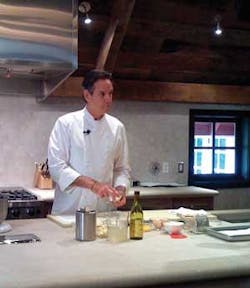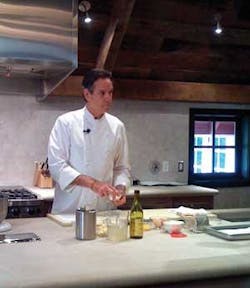If only we could have one more bite ...
by Dag Zapatero, DDS, MAGD
For more on this topic, go to www.dentaleconomics.com and search using the following key words: practice styles, philosophy, values, patient relationships, Dr. Dag Zapatero.
In this column, we are asking members of the Pankey learning community to reflect on finding fulfillment and success in dentistry. Throughout the year, we will present reflections as diverse as the many individuals who write them.
Recently, I had the good fortune to spend some time with one of the world's greatest chefs, Thomas Keller of The French Laundry in Yountville, Calif. The French Laundry (TFL) is consistently ranked among the best restaurants in the world, and Chef Keller is a superstar of the culinary world. Like many of you, gastronomy has been one of my passions. When created with excellence, it can truly be an ethereal experience.
While dining at TFL, diners are struck by the number of courses that are served (11 or more), and the artistry of each preparation. This does not happen by accident. Thomas loves to be generous with his food and he wants to share his gift of food with his patrons. In a PBS interview, Keller stressed that a successful dish is about only two things: product and execution. Both must be present in a dish for it to be considered a success.
At TFL, each dish is prepared in a manner designed not to overstress or damage the natural structure of food. Instead of fresh fish lying flat on its side covered with ice, Keller stores his fish in the swim position to keep the delicate fillets from being crushed by the ice, and meats might be cooked in a water bath under 212 degrees to keep the water in the meats from boiling and damaging the cellular structure of the tissues.
One of my conversations with Thomas revolved around the concept of palate fatigue, which is the time it takes for your palate to be bored by the taste of food. Chef Keller serves only three to five bites of each dish. It sounds novel, designing a serving portion of that small size. You can never fill up on a single dish. What happened to all you can eat?
The “all you can eat” approach might be good if you are the Golden Corral; but if you are TFL, you want to serve your diners just enough food so that when they finish a dish, they say, “I wish I could have one more bite of that.” TFL is all about creating a memorable dining experience and a longing for more. I know I left thinking how good it would be if I could only have one more bite of the oysters and pearls, a sabayon of pearl tapioca with Malpeque oysters and Osetra caviar. I became emotionally attached to the experience and wanted more.
Given this insight into Chef Keller's philosophy has allowed me to reflect on dentistry, and how excellence often produces similar emotions no matter what the field. Before I started my studies at the Pankey Institute, I thought that it was about learning to develop a Pankey-type practice, but discovered that it is really about helping dentists creatively envision their own practice of excellence in the spirit of Dr. L.D. Pankey's personal philosophy of dental practice.
Each of the continuums was like a Keller creation: combining great material with an outstanding faculty to produce a successful dish. After each class, I became curious and I was left with more questions that needed to be answered. I again found myself “wishing for one more bite.” I have come to expect this from good teachers and mentors who have encouraged me to learn. It is about creating a sense of curiosity in us and a desire to experience more.
As I look to define the reason that I am a dentist and bring meaning to my life, I have realized that I am at my best when I do dentistry for myself. Again, this may sound novel. I think this is what Chef Keller does when he creates that emotional bond between his dishes and his patrons. He cooks because it brings him joy to be in his kitchen. He cooks because it brings meaning to his life by feeding and serving others.
Several years ago, a friend told me, “When you do what is right for you, everyone around you benefits.” At first, I found this idea strange and confusing. I was a dentist responsible for taking care of my patients, employees, and family. I came to understand these wise words to mean that when I am happy, the people around me will be happy. When I choose not to compromise on my values, ethics, and philosophy, I am a happier person inside … and happier to those around me.
I have practiced in a variety of practice styles and settings for the last 19 years, from being an associate to an owner employing an associate, and now as a solo practitioner for the last 14 years. I have run three treatment rooms at a time and now work out of one.
I have seen my share of staff turnover through the years. I have experienced the feeling of being on roller skates and having nothing left in the tank at night. But now I am experiencing happiness, passion, and joy in dentistry — and I am rejoicing for our success and consistent years of practice growth.
Understanding myself and developing my personal philosophy of dentistry caused me to change the way I practice dentistry. We fired those patients who made us cringe when their names were on our schedule, and we stopped doing procedures that gave us the same feeling. We began to promote happiness in the practice and created relationships based on health. I stopped being the dental information ATM for my patients, and I began engaging them with a curiosity about their own mouths. I stopped focusing on disease and started pointing out the health I saw in my patients' mouths, even if it was the tissue around two teeth.
I wanted my patients to leave wanting one more bite — feeling curious and wondering if things could be different in their mouths, even if they did not return for a year or two.
We do the most good for our patients when they have an understanding of their mouths and when they choose to make changes that are in their best interests. I experience more joy in working on patients who ask for their dentistry rather than selling dentistry based on the fear that bad things will happen if no action is taken. I can also tell you it is more profitable to practice in this way.
To practice “wishing for one more bite” requires you to establish a relationship with your patients. At TFL, Chef Keller does this by setting the stage in his dining room, hiring and training staff dedicated to his vision, and by his commitment to product and execution, each with the intention of creating the memory of an exceptional dining experience. We can do the same thing in dentistry by creating our own philosophy that promotes excellence and encourages the necessary curiosity for our patients to ask for one more bite.
Dag Zapatero, DDS, MAGD, is a graduate of UNC School of Dentistry, where he currently serves on the Board of the North Carolina Dental Foundation. He is a Master in the Academy of General Dentistry and a member in the Academy of Pankey Scholars. Dr. Zapatero is in private practice in Virginia Beach, Va., where he lives with his wife and two children. You may contact him by e-mail at [email protected].i>

